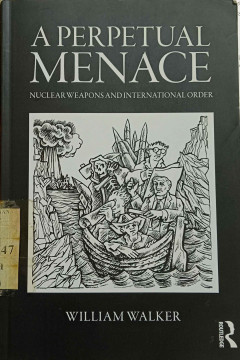Ditapis dengan
Ditemukan 2 dari pencarian Anda melalui kata kunci: subject="3. Security, Internat...

A Perpetual Menace: Nuclear Weapons and International Order
Written by a leading scholar in the field of nuclear weapons and international relations, this book examines 'the problem of order' arising from the existence of weapons of mass destruction. It also explores how various solutions were fashioned in the face of many predicaments, and why these solutions were deemed as effective or ineffective.
- Edisi
- -
- ISBN/ISSN
- 9780415421065
- Deskripsi Fisik
- 239 p. : illus. ; 23,5 cm
- Judul Seri
- -
- No. Panggil
- 327.1747 WAL a

Handbook of Nuclear Proliferation
There was an expectation that the end of the Cold War would herald a new era of peace and stability in which the importance of nuclear weapons was marginalized. Instead, we have been left with a fractious, inter-dependent international community rife with ethnic and religious tension and unbound by super-power competition.
- Edisi
- -
- ISBN/ISSN
- 9781857436044
- Deskripsi Fisik
- 356 p. : Illus. ; 25 cm
- Judul Seri
- Routledge International Handbooks
- No. Panggil
- 327.1747 Pan n
 Karya Umum
Karya Umum  Filsafat
Filsafat  Agama
Agama  Ilmu-ilmu Sosial
Ilmu-ilmu Sosial  Bahasa
Bahasa  Ilmu-ilmu Murni
Ilmu-ilmu Murni  Ilmu-ilmu Terapan
Ilmu-ilmu Terapan  Kesenian, Hiburan, dan Olahraga
Kesenian, Hiburan, dan Olahraga  Kesusastraan
Kesusastraan  Geografi dan Sejarah
Geografi dan Sejarah